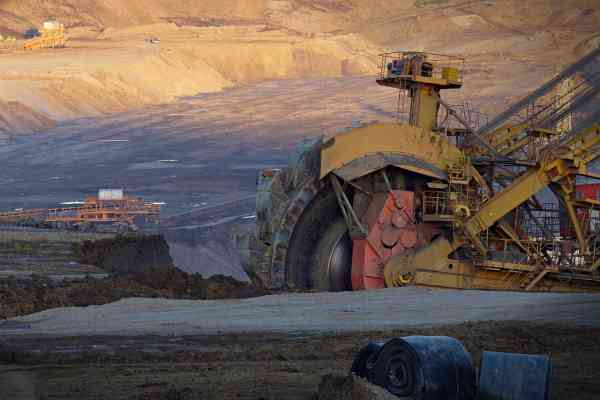March 30th, 2023 | 12:12 CEST
Scarcity threatens energy transition - BYD, Canadian North Resources, Encavis
Critical raw materials are becoming increasingly important with the global challenge of climate change and the need to drive the transition to renewable energy. However, these raw materials, which are essential for manufacturing technologies such as solar cells, batteries and electric motors, are limited and often difficult to access. Securing a stable and sustainable supply of critical raw materials is, therefore, one of the key challenges of climate change.
time to read: 4 minutes
|
Author:
Stefan Feulner
ISIN:
BYD CO. LTD H YC 1 | CNE100000296 , CANADIAN NORTH RESOURCES INC | CA1364271017 , ENCAVIS AG INH. O.N. | DE0006095003
Table of contents:

"[...] China's dominance is one of the reasons why we are so heavily involved in the tungsten market. Here, around 85% of production is in Chinese hands. [...]" Dr. Thomas Gutschlag, CEO, Deutsche Rohstoff AG
Author
Stefan Feulner
The native Franconian has more than 20 years of stock exchange experience and a broadly diversified network.
He is passionate about analyzing a wide variety of business models and investigating new trends.
Tag cloud
Shares cloud
Canadian North Resources - Major beneficiary of the energy transition
The invasion of Ukraine and Europe's resulting dependence on Russian oil and gas has significantly accelerated the transformation to renewable energy as the largest part of the energy mix. However, wind power, photovoltaic systems, and electric cars require significantly more critical raw materials. This is already creating new problems. On the one hand, China owns the lion's share of many of these elementary metals; on the other hand, there are already significant surpluses in demand. It is not for nothing that the US and Canada, in particular, are subsidizing domestic deposits to secure supply chains in the future.
One of the companies that should benefit several times over in the future is Canadian North Resources. The exploration and development company focuses on metals for the clean energy, electric vehicle, battery and high-tech industries. It is advancing its 100% owned nickel, copper, cobalt, palladium and platinum project in Nunavut, Canada. The 253.8 sq km Ferguson Lake property hosts high-grade, large open-pit and underground mineral resources containing base metals. The project, which has been in operation since 1950, has seen over CAD 160 million invested in extensive exploration involving more than 200,000 meters of drilling and 650 drill holes, as well as the development of world-class infrastructure.
The potential for lithium minerals has never been explored in the Ferguson Lake area, but extensive granitic pegmatites have been identified that may contain lithium-bearing minerals. Canadian North Resources plans to conduct its first lithium-specific exploration programs this year. The discovery of a possible lithium resource would add significant value to the already high-grade project.
The market value of Canadian North Resources is approximately CAD 280 million. Positive results on the upcoming resource expansion, as well as the ever-closer preliminary final economic viability study and pre-feasibility study, should continue to fuel the share price. It is currently trading at CAD 2.75.
BYD - Significant jump in profits
Leading Chinese electric car maker BYD closed a fantastic 2022 with its final figures, with the Company's net profit reaching USD 2.4 billion, up 445.86% YOY. The Shenzhen-based company's revenue grew by 96.2% to around USD 61.59 billion last year. In 2022, sales of cars and car products recorded strong growth YOY, which led to a significant improvement in earnings, according to the Company. The Warren Buffett-funded company sold 1.86 million units, more than the previous four years combined. BYD will rank first in NEV sales worldwide, according to the report. The Company had a domestic NEV market share of 27% last year, up nearly 10% from 2021. BYD also accelerated the development of its overseas markets by bringing its NEV cars to markets such as Australia, Japan and Brazil.
BYD management expects continued strong growth momentum in 2023. The Company plans to invest in the core areas of the industrial chain and strengthen itself with strategic partners in the upstream and downstream areas. BYD Company also wants to score points in areas such as smart home devices, gaming hardware and drones, with the group aiming to become a "centennial industrial enterprise" in China.
Encavis - Foregoing dividends
In order to achieve the capacity and sales targets targeted by 2027 under its own steam, last year's profit is to be kept in-house in full. Therefore, the Supervisory Board and Executive Board propose waiving a dividend distribution, as the MDAX-listed company announced after hours on Tuesday when presenting detailed figures for the past year and the new medium-term forecast. Analysts had expected the payout to slightly exceed the previous year's figure of EUR 0.30 per share. With 161 million shares outstanding, this would have meant a payout of around EUR 50 million.
On balance, Encavis earned almost half as much last year as in 2021, but adjusted for non-cash valuation and interest effects, which entail write-downs and deferred taxes, profits rose by over 30% to EUR 101 million. Last year, high electricity prices had given Encavis a tailwind. As a result, the operating profit targets that were not announced until 2025 have already been achieved, as was already known since the preliminary figures presented in mid-February. However, the Group also had to surrender part of its revenue due to the electricity price brake established in various European countries.
According to estimates by the Board of Management, it will not be possible to maintain this high level this year, but it should be significantly exceeded by 2027. In the medium term, the management team led by Christoph Husmann, the Company's new CEO since the beginning of the year, expects sales of EUR 800 million. Operating earnings before interest, taxes, depreciation and amortization, adjusted for special effects, should amount to EUR 520 million. By then, Encavis also aims to have connected 5.8 GW, more than two and a half times its current generation capacity, to the grid. This year's forecast is for sales of just over EUR 460 million, compared with over EUR 487 million last year. However, almost EUR 25 million would still have to be deducted from this due to the electricity price brake. This will also apply in 2023 so that revenue after the deduction of the electricity price brake is expected to be EUR 440 million.
Operating profit is expected to fall from EUR 350 million to around EUR 310 million. Encavis expects operating cash flow to be more than EUR 280 million, compared with EUR 327 million in the past year. However, operating earnings per share are expected to exceed the previous year's figure of EUR 0.60. The share fell by around 6% to EUR 15.02 due to disappointment over the lack of dividend payments. After the figures, the analyst firm Warburg Research left its rating for Encavis at "hold" with a price target of EUR 21.10.
Encavis aims to meet medium-term revenue and earnings targets by retaining profits and, in doing so, has disappointed its shareholders. BYD was able to close a record year. At the same time, Canadian North Resources benefited several times from the shortage of critical base metals for the energy transition.
Conflict of interest
Pursuant to §85 of the German Securities Trading Act (WpHG), we point out that Apaton Finance GmbH as well as partners, authors or employees of Apaton Finance GmbH (hereinafter referred to as "Relevant Persons") may hold shares or other financial instruments of the aforementioned companies in the future or may bet on rising or falling prices and thus a conflict of interest may arise in the future. The Relevant Persons reserve the right to buy or sell shares or other financial instruments of the Company at any time (hereinafter each a "Transaction"). Transactions may, under certain circumstances, influence the respective price of the shares or other financial instruments of the Company.
In addition, Apaton Finance GmbH is active in the context of the preparation and publication of the reporting in paid contractual relationships.
For this reason, there is a concrete conflict of interest.
The above information on existing conflicts of interest applies to all types and forms of publication used by Apaton Finance GmbH for publications on companies.
Risk notice
Apaton Finance GmbH offers editors, agencies and companies the opportunity to publish commentaries, interviews, summaries, news and the like on news.financial. These contents are exclusively for the information of the readers and do not represent any call to action or recommendations, neither explicitly nor implicitly they are to be understood as an assurance of possible price developments. The contents do not replace individual expert investment advice and do not constitute an offer to sell the discussed share(s) or other financial instruments, nor an invitation to buy or sell such.
The content is expressly not a financial analysis, but a journalistic or advertising text. Readers or users who make investment decisions or carry out transactions on the basis of the information provided here do so entirely at their own risk. No contractual relationship is established between Apaton Finance GmbH and its readers or the users of its offers, as our information only refers to the company and not to the investment decision of the reader or user.
The acquisition of financial instruments involves high risks, which can lead to the total loss of the invested capital. The information published by Apaton Finance GmbH and its authors is based on careful research. Nevertheless, no liability is assumed for financial losses or a content-related guarantee for the topicality, correctness, appropriateness and completeness of the content provided here. Please also note our Terms of use.




